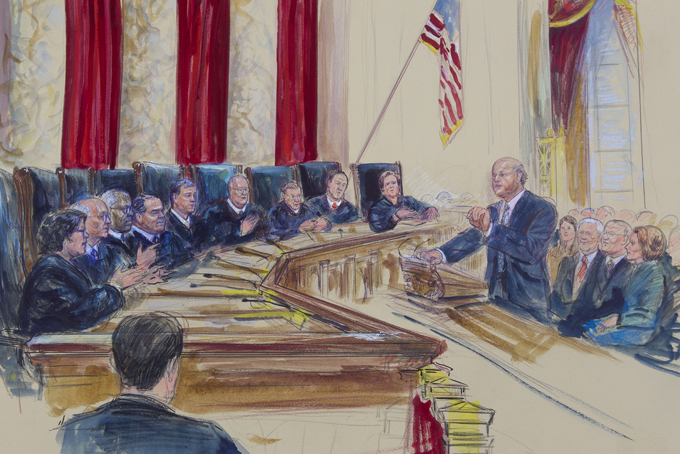
WASHINGTON (AP) — Sharply divided along familiar lines, the Supreme Court took up a politically charged new challenge to President Barack Obama’s health overhaul Wednesday in a dispute over the tax subsidies that make insurance affordable for millions of Americans.
The outcome in what Justice Elena Kagan called “this never-ending saga” of Republican-led efforts to kill the Affordable Care Act appears to hinge on the votes of Chief Justice John Roberts, whose vote saved the law three years ago, and Justice Anthony Kennedy.
Roberts said almost nothing in Wednesday’s 85 minutes of lively back-and-forth, and Kennedy, who voted to strike down the health law in 2012, asked questions of both sides that made it hard to tell where he might come out this time.
Otherwise, the same liberal-conservative divide that characterized the earlier case was evident in the packed courtroom with the same lawyers facing off as in 2012.
Millions of people could be affected by the court’s decision. The justices are trying to determine whether the law makes people in all 50 states eligible for federal tax subsidies to cut the cost of insurance premiums. Opponents say that only residents of states that set up their own insurance markets can get federal subsidies to help pay the premiums.
Roughly three dozen states did not set up their own exchanges and rely on the federal healthcare.gov. The Obama administration says it would make no sense to condition subsidies on where people live, and that doing so would set off a “death spiral” in which enrollment declined, driving premiums up and leaving only the sickest, and costliest, people insured.
Liberal justices peppered lawyer Michael Carvin almost from the outset of his argument to limit the subsidies.
Justice Ruth Bader Ginsburg said the law set up flexibility for states to either set up their own markets or rely on federal healthcare.gov. Giving subsidies only to people in some states would be “disastrous,” she said. “I have never seen anything like this.”
Several justices tried to use Carvin’s comments from the 2012 case that seemed to cut against his argument Wednesday.
Finally, Roberts gently came to his defense. “Mr. Carvin, we’ve heard talk about this other case. Did you win that other case?” Roberts said as laughter washed over the courtroom. “So maybe it makes sense that you have a different story today?”
When Solicitor General Donald Verrilli Jr. stepped to the lectern, the liberal justices fell silent, and Justices Samuel Alito and Antonin Scalia took over. They questioned Verrilli over the four words in the law, “established by the state,” that the challengers say are clear and conclusive evidence that Congress wanted to limit the subsidies to state-run exchanges.
“I mean, it may not be the statute they intended. The question is whether it’s the statute that they wrote,” Scalia said of the provision in question, part of a more than 900-page law that passed Congress without a single Republican vote in 2010.
Verrilli argued that the law can only be read broadly because its very purpose was to reduce the ranks of the uninsured. He noted that millions would lose health insurance if the court rules against the administration.
Alito wondered whether the justices could delay the effect of such a ruling to allow states and perhaps the federal government to enact a remedy. Scalia said he believed Congress, where majority Republicans have staunchly opposed the law and held dozens of votes to repeal it, would act.
“This Congress, Your Honor?” Verrilli said to widespread laughter among listeners who included leading congressional Democrats and Republicans.
Kennedy’s questions Wednesday could give hope to both sides.
He suggested that challenger Carvin’s argument raised a “serious” constitutional problem affecting the relationship between states and the federal government.
If the court buys Carvin’s case on subsidies, “the states are being told either create your own exchange or we’ll send your insurance market into a death spiral,” Kennedy said.
On the other hand, he said, “It may well be that you’re correct as to these words, and there’s nothing we can do. I understand that.” Kennedy also seemed less than convinced by Verrilli’s reading of the law to allow the subsidies nationwide.
Each side in the case argues that the law unambiguously supports only its position. However, one other option for the court would be to declare that the law is ambiguous when it comes to subsidies and defer to the Internal Revenue Service’s regulations making tax credits available nationwide.
Verrilli advanced this point as his backup argument, provoking one of Roberts’ few comments. If the court finds that the law is ambiguous and bows to the current administration’s take on the law, Roberts said, “that would indicate that a subsequent administration could change that interpretation.”
With four votes in hand, the administration would appear to need only one more, either from Roberts or Kennedy, to prevail. The challengers would need both justices to win.
A decision in King v. Burwell, 14-114, is expected by late June.
___
Associated Press writer Ricardo Alonso-Zaldivar contributed to this report.
___
Follow Mark Sherman on Twitter at: https://www.twitter.com/shermancourt
